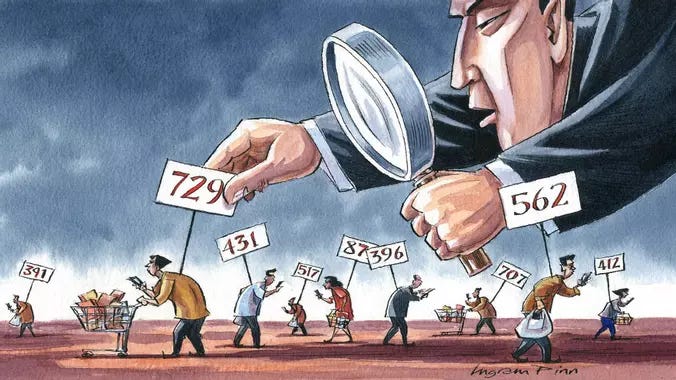Economic Control and Totalitarianism
Notes from a chapter of the same name by F. A. Hayek
To run an economy with the greatest level of efficiency it would be best, one would think, if it be directed by a staff of experts. This staff then should be under the command of an individual expert who, untroubled by any inefficient democratic procedure, be free to execute the will of the economic experts under his command. This highly efficient team could deliver excellent economic results, and although the general population have been excluded from the process they would enjoy much greater benefits in every other area of civil life.
If indeed these tedious matters of economy were planned by a small and skilful team of experts, would that not free the rest of us from such concerns to pursue higher and more important and certainly more interesting things? After all, streamlining the economy into an equitable and efficient system is just a matter of applying the correct algorithms by the experts who know how these things work.
Right?
The thought that the utilitarian machinery of economic planning is in any way separate from any other part of life is an error. There is no economic motive in isolation - there are only economic factors toward a certain end. Money is an instrument of freedom or control and any economic planning is by necessity planning of freedom or control. Not only freedom or control over what we might consider marginal needs over the more important, but the ability to define what is marginal and what is essential.
The authority directing all economic activity would control not merely the part of our lives which is concerned with inferior things; it would control the allocation of the limited means for all our ends. And whoever controls all economic activity controls the means for all our ends and must therefore decide which are to be satisfied and which not. This is really the crux of the matter. (Hayek, The Road To Serfdom, p.126)
Economic control is not just control over the ‘economic’ sector of life but the control over all our ends, and the determination of what those ends should be.
I’m imagining for a moment a future in which you go to prepay for some fuel. You wave your hand over the scanner to provide the required credit and the scanner flashes red. “Sorry but you don’t have any more credit today for fuel,” says the girl behind the counter, reading your profile alerts from her screen. Her anxiety elevates a little as she sees the low social compliance score and elevated risk of verbal assault warnings - that unfortunate incident you had six months ago in a similar situation over meat rationing at the local supermarket - those harsh words to the manager will forever be part of your record.
You look out at your car in the one fuel bay at the station, an oddity among the rest of the electric cars charging up. You know you are being punished for having an environmentally dangerous combustion engine - an environmental terrorist to some - and you are being forced to cease such a reckless and irresponsible lifestyle.
Central planning means that the economic problem is to be solved by the community instead of by the individual; but this involves that it must also be the community, or rather its representatives, who must decide the relative importance of the different needs… The power of the planner over our private lives would be no less complete if he chose not to exercise it by direct control of our consumption. (Hayek, The Road To Serfdom, p.127)
The digital currency revolution of the mid 2020s was hailed by many as a godsend - crime, it was reported, was completely crippled and a more equitable world was emerging for everyone on the planet. But your monthly credit allocation, being region specific and tied to your many purchasing limits, never seemed to be able to work for the hard copy books you wanted to buy from Amazon. Sure, Political Ponerology, that set of essays by C.J. Hopkins, and other similar books had the usual warnings plastered over the cover image (like the nasty warnings on cigarette packets), but there was no indication that you couldn’t purchase them. But could you get your credit to make a successful purchase? - “Not available in your region,” “Sorry your credit is incompatible for this item,” “Sorry you have no more credit allocation for Amazon. Please check back when more credit is available,” and on and on it goes. The help bot says it is available and to try again. Meanwhile the politicians celebrate “a world that is more free and equitable than it has ever been,” beaming with self-congratulation on utopia found. Fortunately there is a guy who used to own a book shop, an actual physical bookshop, and he went underground in 2028 and has been trading books for gold and silver ever since. At least he had a second hand Bible that you were able to pick up for a 1oz silver coin - bargain!
… for most of us the time we spend at our work is a large part of our whole lives, and as our job usually also determines the place where and the people among whom we live, some freedom in choosing our work is, probably, even more important for our happiness than freedom to spend our income during the hours of leisure… Few people ever have an abundance of choice of occupation. But what matters is that we have some choice, that we are not absolutely tied to a particular job which has been chosen for us, or which we may have chosen in the past, and that if one position becomes quite intolerable, or if we set our heart on another, there is almost always a way for the able, some sacrifice at the price of which he may achieve his goal. Nothing makes conditions more unbearable than the knowledge that no effort of ours can change them; and even if we should never have the strength of mind to make the necessary sacrifice, the knowledge that we could escape if we only strove hard enough makes many otherwise intolerable positions bearable. (Hayek, The Road To Serfdom, p.128-9)
Bill and Amanda had lived almost exclusively on the UBI1 digital credit system since 2027 until their first child reached school age some ten years later. It was tough going for a couple who could never pull up their SCS2 because of an alleged participation in an anti-government rally way back in 2024 - getting work was near impossible. But they had hopes for their daughter and her future in the workforce. Even with the school reforms (everything was now online and children had opportunity to enter one of five ‘streams’ of education3) they knew their bright and tech-savvy daughter had a good chance of getting into the technology stream. However things didn’t work out well for the Ferguson family during their daughter’s first automated school interview.
Although Bill and Amanda eventually chose to take their 6-monthly vaccines as “responsible citizens”, they had been paying a rogue doctor in silver to falsify their daughter’s records as they did not want her injected with whatever it was they were being injected with. The family was relatively isolated and so they had avoided the tracking issues with their daughter being “un-chipped” and therefore not scannable. Bill, although not working (and maybe because he wasn’t working), had a good handle on current tech and knew his way around some of the key issues of not being fully catalogued4. What the family didn’t realise is that their doctor had been compromised just a few weeks prior to the school interview. The authorities hadn’t caught up with them yet, but already the family’s SCS reflected the criminal behaviour. The school interview started with confirmation that the Ferguson child was eligible for only the lowest stream of education. The “scum class” stream, as people would say, that only delivers enough education for a child to do the most basic working class jobs - jobs that were becoming increasingly rare in the face of massive automation.
It was the beginning of a cycle - a downward oppressive cycle for the Ferguson family. But according to statistics the SCS had created unprecedented life satisfaction, security and happiness for all… except for maybe the Ferguson family and their rogue doctor. Just a week later Bill and Amanda were arrested and imprisoned5 for child abuse and their daughter put into the care of the State where she would receive the best healthcare in human history.
The passion for the “collective satisfaction of our needs,” with which our socialists have so well prepared the way for totalitarianism, and which wants us to take our pleasures as well as our necessities at the appointed time and in the prescribed form, is, of course, partly intended as a means of political education. But it is also the result of exigencies of planning, which consists essentially in depriving us of choice, in order to give us whatever fits best into the plan and that at a time determined by the plan.
By the 2040s ownership of real, tangible assets was a thing of the past - from a primitive and selfish era of our evolution that had, happily, passed into the history books, so to speak. Virtual assets, however, more than replaced the real, with stunning opportunities in the metaverse for ruling over entire solar systems from your State owned pod in one of the many massive centralised pod skyscrapers - like Shenzhen’s 豆荚城 (pod city). But even though no regular people own any real assets exept basic things like clothing and personal hygeine products, they are happy - at least that’s what the statistics say. There is a continual stream of news reports saying “New Research Finds New World Citizens Are 17% Happier…” and other assorted official declarations of mental, physical and emotional wellbeing - the luckiest generation that have ever lived, so goes the slogan.
It is often said that political freedom is meaningless without economic freedom. This is true enough, but in a sense almost opposite from that in which the phrase is used by our planners. The economic freedom which is the prerequisite of any other freedom cannot be the freedom from economic care which the socialits promise us and which can be obtained only by relieving the individual at the same time of the necessity and of the power of choice; it must be the freedom of our economic activiy which, with the right choice, inevitably also carries the risk and the responsibility of that right. (Hayek, The Road To Serfdom, p.132-3)
Universal Basic Income
Social Credit Score or Social Credit System - after a few year of implementation people would refer to it as just “the score”.
Acceptance into any stream dependent, of course, by not only the SCS of themselves and family members, but a battery of psychological, physiological, neurological and ideological tests.
T&T they would say - “track and trace”
No trial necessary in such obvious cases of neglect - especially in regards to vaccination.







